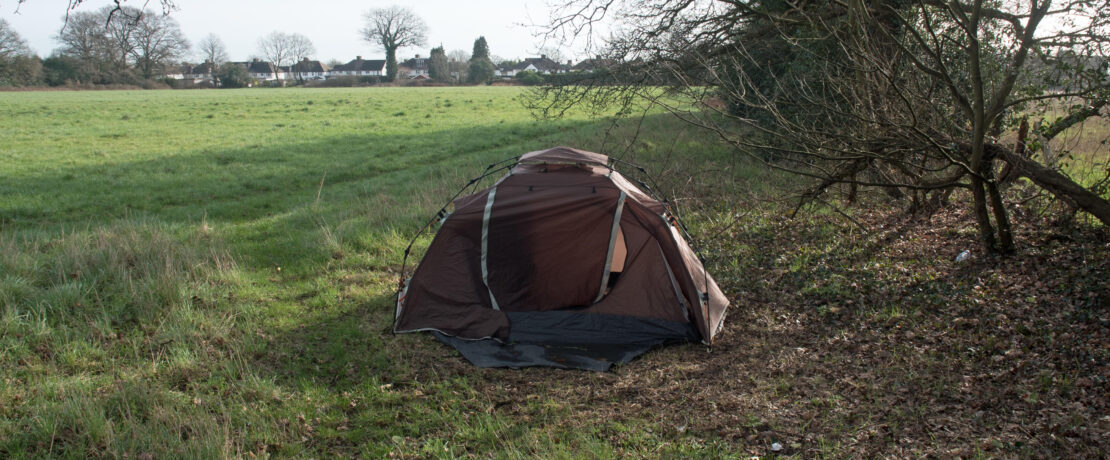Groundbreaking report shows chronic increase in rural homelessness
The countryside is beset by a ‘hidden homelessness’ crisis driven by soaring housing costs and a gaping shortfall in local authority funding, a new report shows.
The true scale of the crisis is likely to be far higher than the official statistics. The year-long study, which included a survey of 157 frontline support workers, service providers, NGOs, and shelters, found a large majority thought rural homelessness was a serious problem that was getting worse. Key findings include:
- 91% of respondents in rural areas have seen homelessness increase in the past five years.
- 83% of respondents in rural areas said their job had become harder in the past five years.
- 81% of respondents believe that rough sleeping is experienced differently in rural areas compared to urban areas.
Underfunded local authorities
The study was conducted by academics at the University of Kent and the University of Southampton. It was commissioned by English Rural and co-funded by a coalition of rural charities and housing associations (including CPRE). It shows that rural areas receive a fraction of what they need to tackle homelessness in their communities.
Overall, rural local authorities are receiving 65% less in funding per capita through the Homelessness Prevention Grant than urban areas, who are themselves chronically underfunded. Statistics released by the Department for Levelling Up Housing and Communities show a sharp difference in financial aid. For example, urban local authorities received £7.15 per homeless person, compared to just £2.50 per homeless person paid to rural local authorities.
Life and health in jeopardy
Interviews with more than 40 people, including people who sleep rough and outreach workers in four rural locations, paint a striking picture of isolation and resilience.
People who experience homelessness in rural areas often sleep rough in farmland or woodland. This makes them much harder for outreach workers to find and support, and puts their life and health in jeopardy. Real life stories shared with researchers were harrowing. They included people digging trenches in the snow to sleep, going several days without food, being spat on, their tents set on fire, and muggings that resulted in brain injuries and teeth being knocked out.
The study found that isolation also made the problem far worse. Limited transport options and a lack of support placed those facing rural homelessness at greater risk. Those with physical or mental health needs were found to be most vulnerable.
Growing rural crisis
Martin Collett, chief executive of English Rural and co-chair of the research project, said:
‘This research shines a spotlight on a growing rural crisis hidden in plain sight. You see here the brutal reality beyond the insufficient official statistics. People who have no chance of affording a basic standard of living through no fault of their own. You don’t tend to see people sleeping rough in rural areas. But they’re there, normally hidden in agricultural buildings, outhouses, sleeping rough on farmland or condemned to an insecure life of sofa surfing. Because funding is so inadequate, many people are moving to urban centres for much needed support. It is in all our interests to fix this crisis.
‘Rural homelessness is a significant problem, and a lack of support and funding for affordable homes and services in these areas puts vulnerable households at a distinct disadvantage. The findings of this research should drive a step change in our approach to the issue. Local and national leaders must come together to say clearly that ‘rural homelessness counts’.
Farmers were frequently cited as a lifeline by those experiencing rural homelessness, allowing people to pitch tents in their fields and providing clean water and cups of tea in the morning. But some farmers expressed frustration at regulations they said prevented them from allowing rough sleepers to stay on their land, for fear of criminilisation by local authorities.
A national disgrace
Tom Fyans, interim chief executive of CPRE, said:
‘Farmers caring for people sleeping rough in their fields is a shocking indictment of government indifference. This is a political choice, paid for by our most vulnerable. It shouldn’t be this way, but chronic underfunding and years of slashed budgets means there is no longer a social safety net in the countryside.
‘In many cases, the kindness of others hides the extent of the homelessness crisis in rural areas. It’s very generous, and no doubt welcome, but contributes to the true scale of the crisis going unreported.
‘Hard working people are falling through the cracks of a broken system and the government must take responsibility. We need immediate action to fix a growing affordable housing crisis that, in one of the richest countries in the world, is nothing short of a national disgrace.’
Commitment to tackle rural homelessness
The coalition is calling for local and national leaders to make a clear commitment that ‘rural homelessness counts’. They are recommending:
- All future homelessness and rough sleeping strategies consider the needs of rural communities and ‘at risk’ residents living in them.
- Improved processes for better counting and identifying instances of rural homelessness.
- Delivering new homelessness support services in rural communities that address mental health and social and physical isolation.
- Dedicated investment to fund much needed rural social housing and increasing funding through the welfare system to cover the cost of rent.
Read the full report on the English Rural website
If you want to help tackle rural homelessness in your area, consider supporting our work by becoming a member.








